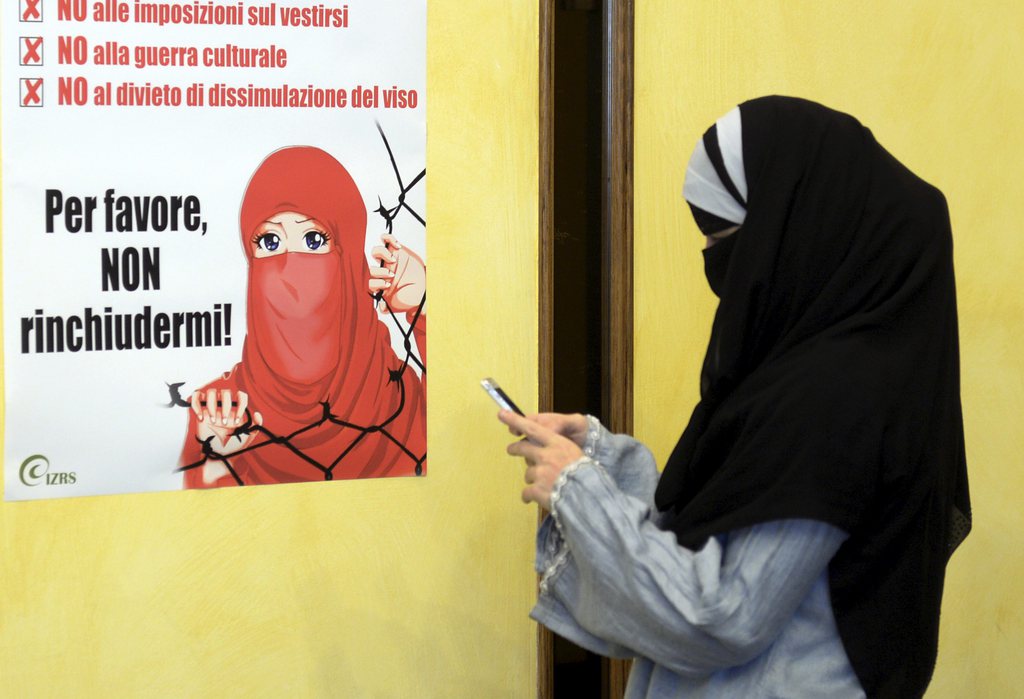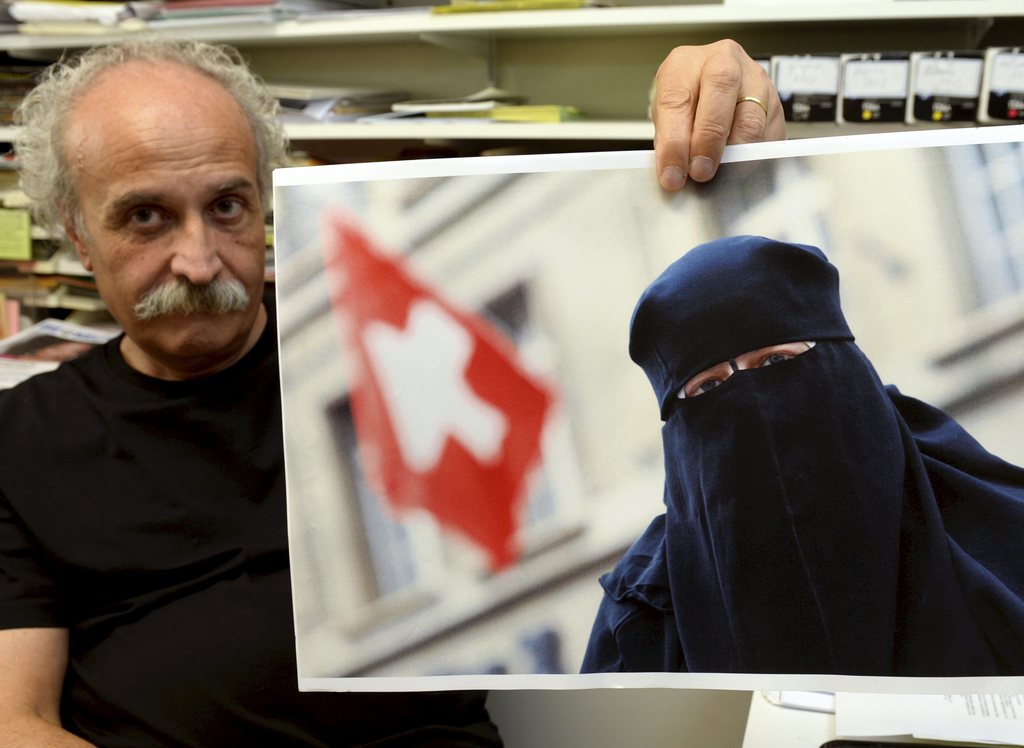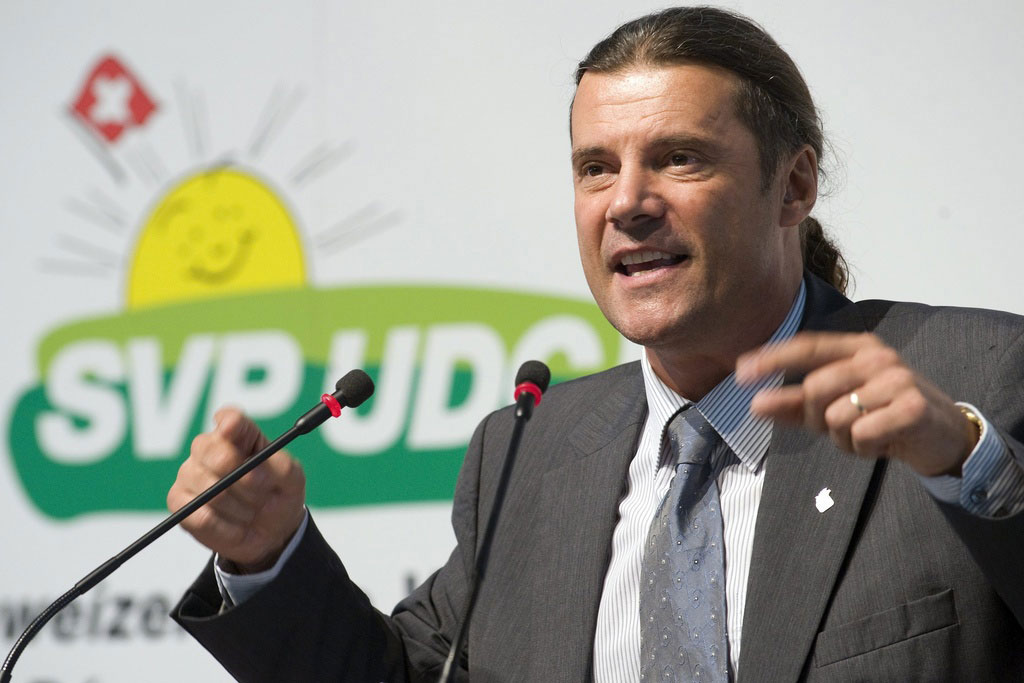Ticino burka vote could spawn others

The massive turnout in favour of banning burkas from public spaces in Ticino could lead to a nationwide vote on the same issue, a possibility of real concern to human rights organisations and Switzerland’s Muslim community.
On September 22, Italian-speaking Ticino became the first Swiss canton to accept such a ban, with more than 65 per cent of voters in favour. This result has boosted the hopes of those backing a future nationwide initiative.
“The text is ready. It is similar to one put forward by canton Aargau and rejected by the federal parliament in 2012,” Ulrich Schlüer of the rightwing Swiss People’s Party told Geneva’s Le Temps newspaper.
Schlüer, a former member of the House of Representatives, is best known as the driving force behind the anti-minaret initiative accepted by Swiss voters in 2009.
One of his party colleagues, Walter Wobmann, told Swiss television that the effort to collect the 100,000 signatures needed to force a vote on a burka ban would likely begin in spring 2014.
The text would be along the lines of legislation already adopted in France in 2010 and in Belgium two years ago. If all the requirements are met, a vote on a Swiss nationwide ban is unlikely to take place before 2015, the same year as the next federal elections.

More
Burka ban approved in Italian-speaking Switzerland
Integration question
The anti-burka proposal has some support on the centre-right as well.
“Burkas are not compatible with our values or integration goals,” Christophe Darbellay, president of the Christian Democrats, told the Nouvelliste newspaper. “I know the difference between a tourist and a person coming to live in Switzerland, who is expected to integrate.”
“It’s a matter of security,” added his party colleague Urs Schwaller. “The police have to be able to identify people, and to do that you have to see their face.”
Oskar Freysinger of the People’s Party, another backer of the anti-minaret initiative, calls the burka “a cloth prison that is just the visible form of a dogmatic jail”. In 2010, his request for a similar ban was rejected by parliament on the basis that it was up to the cantons to decide for themselves whether it was a security issue.
As a recently elected cantonal minister in Valais, Freysinger has toned down his rhetoric, saying now that any initiative text would have to be discussed “to avoid a new war of religions”. But he warns that if parliament refuses to legislate and force people to show their faces in certain situations, politicians should not be surprised if voters accept a ban.
The Ticino ban still has to be approved by the federal parliament. The procedure will take at least two years, although it is rare for parliament to refuse a cantonal law.
The burka ban could fail to pass muster in the court, however. It could be deemed disproportionate, counter to freedom of religion and not sufficiently justified to be in the public interest.
The Federal Court has never had to rule on this kind of legislation. The European Court of Human Rights will reach a verdict by the end of the year on a number of complaints filed after France introduced legislation making it illegal to conceal one’s face.
Opposition on alert
Human rights organisations – the strongest opposition to Ticino’s burka ban – are concerned about the debate spreading to the national arena.
“People wearing burkas is non-existent problem that is being used for political aims,” said Nadia Boehlen, spokeswoman for Amnesty International Switzerland. “Those calling for a ban say they are fighting intolerance, but they are only encouraging anti-foreigner tendencies and Islamophobia. They also risk damaging Switzerland’s reputation in Muslim countries.”
And for Green Party parliamentarian Ueli Leuenberger, it is all an “irrational ideological campaign on a non-existent topic”.
Nadia Karmous, the president of the Swiss Muslim women’s cultural association, says that the proposal is nothing less than a “new kind of crusade, a new form of violence against Muslims”.
As far she knows, other than diplomats’ wives and tourists, there are only a dozen women in Switzerland who wear a full-body veil, most of them converts to Islam. “In France and Belgium, women began wearing burkas as a reaction to new laws. A ban creates more problems than it solves,” she added.
Karmous says that integration, which already suffered during the emotional anti-minaret campaign, could become more problematic if there is a national debate about a burka ban.
French businessman Rachid Nekkaz has announced that he will pay all the fines levied against women for wearing burkas and niqabs in Switzerland. Already active in France and Belgium, he says he wants to extend his fight against “runaway Islamophobia” after Sunday’s vote in Ticino.
In July 2010, he set up a fund with €1 million (CHF1.23 million) to pay fines in France and Belgium. So far, he has paid 682 fines worth a total of €123,000, according to his own figures.
Nekkaz says he is a human rights activist, ready to show how ridiculous any government or parliament is if it refuses to respect the fundamental rights set out by the European Human Rights Convention.
Source: Swiss News Agency
“Many Muslims who were prepared to talk with other religions have withdrawn into themselves and their families. They will have trouble integrating and being more open with others,” she pointed out.
Freysinger says there is no desire to discriminate against the Arab world or any kind of racism behind a ban. Quite the opposite, he believes.
“We want these women to become European citizens, like our women. We are attacking a ferociously patriarchal society that applies a brutal form of segregation. I am surprised that people on the Left would defend that,” he added.
But Karmous is not convinced. “Those politicians are not heroes, and they are not out to save Muslim women,” she said. “They would be better off fighting for a more noble cause, like against the war in Syria, rather than telling tall tales.”
(Translated from French by Scott Capper)

In compliance with the JTI standards
More: SWI swissinfo.ch certified by the Journalism Trust Initiative












You can find an overview of ongoing debates with our journalists here . Please join us!
If you want to start a conversation about a topic raised in this article or want to report factual errors, email us at english@swissinfo.ch.